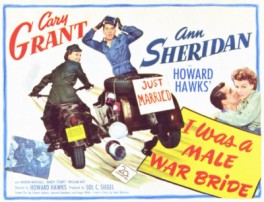
I WAS A MALE WAR BRIDE
US, 1949, 105 minutes, Black and white.
Cary Grant, Ann Sheridan.
Directed by Howard Hawks.
The I of the title of this film is played by Cary Grant, the film is rather complicated in its story and ends up with Cary Grant posing as a war bride.
The film was made in Europe in the aftermath of World War Two. Grant plays a French captain working with an American lieutenant, Ann Sheridan. They are antagonistic towards each other in the first half of the film but then fall in love while they work together to cover a scientist who is under suspicion from the Americans.
When they marry, the only way that a spouse can get back to the United States from Europe is through the War Brides Act and so Cary Grant has to pose as a war bride … This leads to an amount of slapstick and situation comedy.
The film is probably more important as a sidelight of Howard Hawks’ career. He had begun directing in the 1920s, had a very successful 1930s with such films as Twentieth Century, Barbary Coast, Come and Get It. He then worked with Cary Grant in three films: Bringing Up Baby, Only Angels Have Wings and His Girl Friday. Other films of the 40s include Sergeant York and Ball of Fire. Prior to I Was a Male War Bride he worked with Danny Kaye in A Song is Born, John Wayne in Red River, Humphrey Bogart and Lauren Bacall in The Big Sleep and To Have and Have Not. Less prolific during the 1950s and 1960s, he directed Gentlemen Prefer Blondes and a number of films with John Wayne including the classics Rio Bravo and El Dorado. His final film was a John Wayne western, Rio Lobo in 1970.
1. A comedy: crispness of dialogue, cleverness and wit, strength of characterizations and interactions, humorous situations?
2. The authenticity of atmosphere in the use of German post-war locations, the look and the feeling for the place? Americans in post-war Germany?
3. The contribution of Cary Grant and his style of comedy? Was he credible as a French officer? Ann Sheridan and her style of comedy?
4. The film as an illustration of the battle of the sexes, in the post-war situation? Why did they clash, fight, enjoy clashing? The various expressions of this, verbally and in humorous situation, how close were they? The recognition of this and its consequences?
5. The comedy of the battle of men and women? The characteristics of men, of women, their clashes, strengths and weaknesses, mutual appeal?
6. Comedy via the reversal of roles? Kathryn and her role in the army, her wearing the pants and driving the motor cycle? Henry and his identification as a woman, having to don woman's clothes? What did these situations say about the roles of man and a woman?
7. The film's reliance on traditional attitudes towards men and women? Expectations of behaviour, courtesy and manners etc.? Treatment of each, for example when Henry was looking for things to spend the night?
8. The role of red tape and bureaucracy, especially the roles of women? The comedy comment on this?
9. The details of humour in the initial trip by motorcycle, farcical situations, identity etc? Sexual overtones and innuendo? The task in the town, the humour of Perry's arrest, of achievement?
10. The proposal after the experience in the haystack? A humorous bringing of things to a head?
11. The satire and parody in the rigmarole of red tape, the satire on bureaucracy, America, the Army and the Navy? How humorous were the jokes? Harry as victim? The long episode of the first night?
12. The presentation of Americans in Europe? How much point in this kind of comedy?